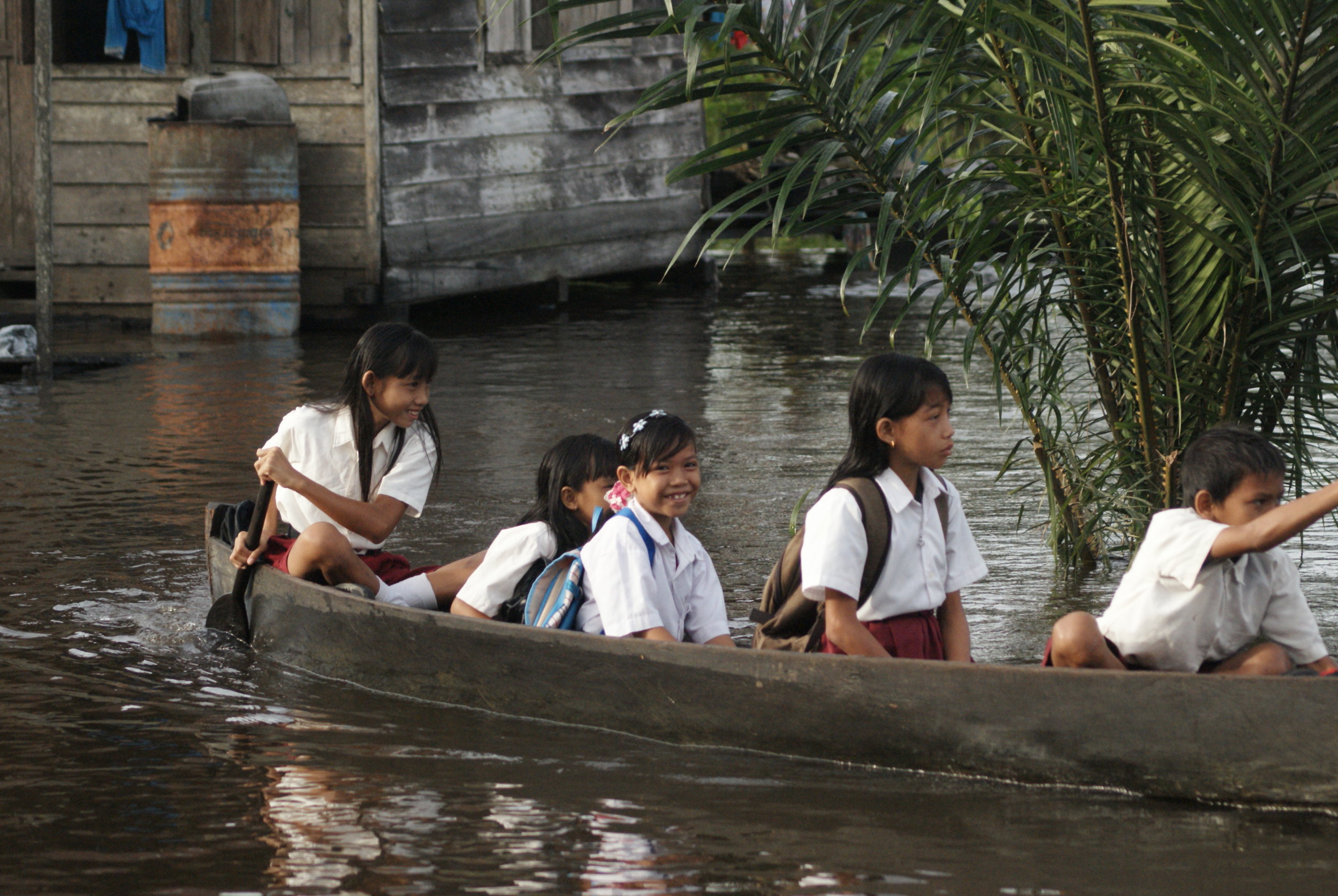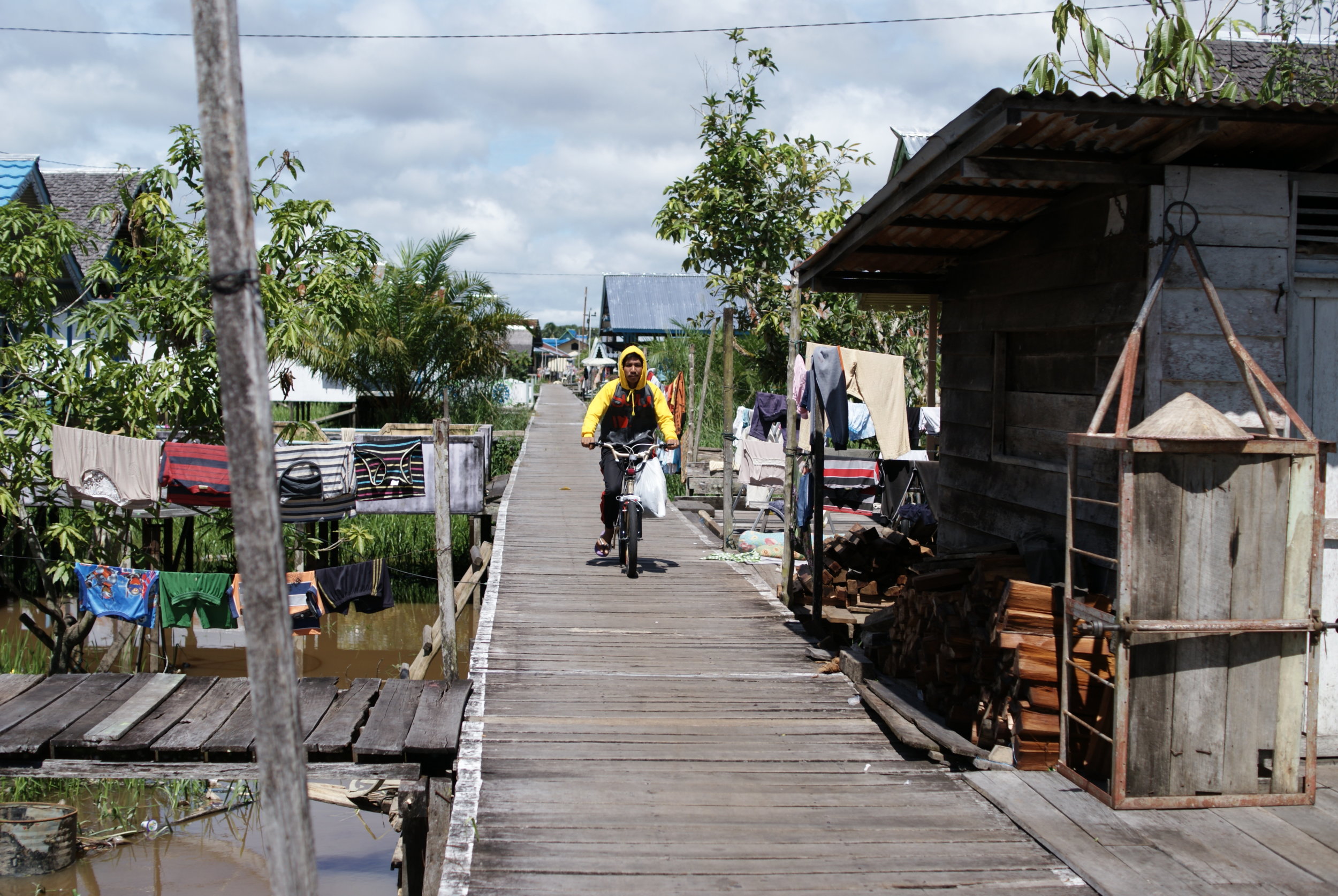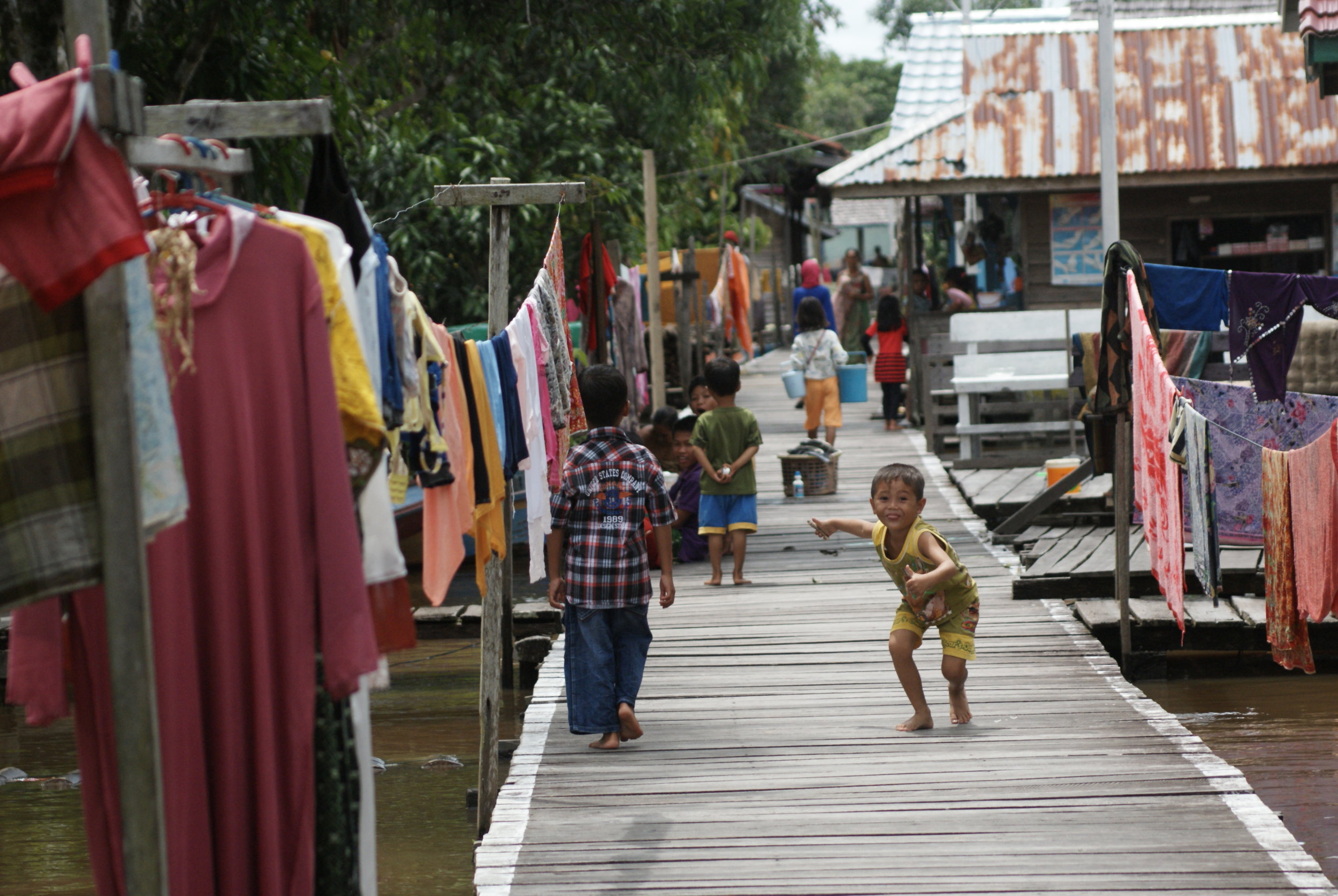The Siawan Belida REDD+ Project in Indonesia: Community-Oriented Approaches to Consultation and Grievance Handling
by Dr kate macdonald and Dr samantha balaton-Chrimes
This case study focuses on transnational business activity in the form of investment in a forest conservation project developed by private sector investors in partnership with the NGO Fauna & Flora International under the international REDD+ framework. This case study differs from other cases examined in this series of reports as it involves both private sector and not-for-profit organisations as joint project proponents.
Issues
At the time of our research the project had not formally commenced operation, though preliminary activities surrounding project development and community consultation had been undertaken. During these preparatory phases of the project, several prospective impacts of the project on social and human rights received particular attention. One important issue related to the implications on community livelihoods for proceeding with the REDD+ project, versus endorsing a range of alternative scenarios for the zoning and licensing of land in the designated project area. Another cluster of issues related to the proposed terms of the REDD+ project, such as community access to land, and the sharing of prospective REDD+ revenues.
Non-judicial redress mechanisms
The only mechanisms that had actually been used by communities at the time of our research were project-based consultation and informed consent processes, together with informal grievance channels associated with the project development process. International grievance mechanisms linked to project funders were available, but had not been utilised. Dispute handling mechanisms available at national and sub-national levels had also not been used. A number of local and transnational grievance systems linked to the REDD+ framework have been undergoing development in recent years, but these were not operational at the time of our research.
Outcomes and lessons
This case offers a number of constructive lessons regarding how project-level consultation and grievance handling can support community rights. However, it also highlights the limits of what can be achieved by consultation and grievance handling mechanisms at the project level, even when internal systems established by project proponents are strong. Despite very strong project-level consultation processes, the communities’ express wishes were ultimately not followed. Specifically, the project was not in the end able to go ahead on the terms to which communities expressed their consent. The project became stalled for an extended period and was ultimately discontinued, largely due to political obstacles surrounding the granting of the required Ecosystem Restoration License by the Indonesian government. Such external constraints highlight the value of project level processes of consultation and grievance handling that are clearly engaged with grievance handling processes at national and sub-national levels, and sufficiently flexible to respond to changing external circumstances.
EXECUTIVE SUMMARY
Background and overview
This case study focuses on transnational business activity in the form of investment in a forest conservation project developed by private sector investors in partnership with the NGO Fauna & Flora International—under the international REDD+ framework. This case study differs somewhat from other cases examined in this series of reports, in that it involves both private sector and not-for-profit organisations as joint project proponents.
At the time of our research the project had not formally commenced operation, though preliminary activities surrounding project development and community consultation had been undertaken. During these preparatory phases of the project, several prospective impacts of the project on social and human rights received particular attention. One important issue related to implications for community livelihoods of proceeding with the REDD+ project, versus endorsing a range of alternative scenarios for the zoning and licensing of land in the designated project area. Another cluster of issues related to the proposed terms of the REDD+ project, such as community access to land, and sharing of prospective REDD+ revenues.
Our analysis of grievance handling mechanisms in this case encompasses not only those mechanisms that communities can use to seek redress for perceived ‘wrongs’ associated with the project, but also broader mechanisms of voice through which communities can express preferences or concerns regarding actual or expected project impacts. Our analysis therefore encompasses consultation and project governance arrangements, as well as special purpose grievance mechanisms.
The primary mechanisms that communities have used to express preferences and concerns about the REDD+ project have been processes of informed consent at the project level, together with informal complaints processes associated with the project development process. Individual or collective concerns about the project during its initial development stages were able to be communicated to project proponents through informal channels facilitated by local NGOs. A formal grievance mechanism was designed, but at the time of our research was not yet operational.
A number of local and transnational grievance systems linked to REDD+ nationally or internationally have been undergoing development, but were not operational for this project. Several international grievance mechanisms linked to project funders were formally available, alongside administrative or judicial dispute handling processes at national and sub-national levels, but these were not utilised.
The lack of use of such external redress mechanisms can be attributed in large part to the generally positive relationship between communities and project proponents, and the absence of a perceived harm or wrong associated with project activities. Our analysis also pointed to broader underlying limitations of available mechanisms:
· Administrative and judicial mechanisms are often limited by: weak community outreach and accessibility, particularly for geographically remote communities; weakness of financial, organisational and/or human resourcing; weak community trust in administrative or judicial processes; and/or restriction of scope of such mechanisms to specific kinds of disputes, such as those involving violations of particular laws or regulations. In some cases this limits the ability for such mechanisms to offer redress regarding broader community concerns such as Free Prior and Informed Consent (FPIC) processes or resource access security.
· Transnational mechanisms are often limited in relation to their scope (since they are usually available only where a project has received finance from specific countries or multilateral bodies, and where violations of specific transnational policies or standards can be demonstrated). There are also often significant barriers to for communities seeking information about or access to these mechanisms.
Performance of project-based consultation and grievance handling systems
Focusing on the project-level consultation and grievance handling systems that have been used in this case, how have these mechanisms contributed to improving human rights outcomes for the communities involved?
· A relatively successful process of community consultation and informed consent was coordinated by the project developers. An extensive process of consultation occurred, and all representatives of the eight villages expressed in principle support for the project.
· However, despite strong project-level consultation processes, the expressed wishes of communities were ultimately not followed, in the specific sense that the project was not in the end able to go ahead on the terms to which communities expressed their consent. The project became stalled for an extended period and then was ultimately discontinued, due largely to political obstacles surrounding granting of the required Ecosystem Restoration License by the Indonesian government.
· Because consultation and grievance handling processes were located at the project level, they were unable to address issues influenced decisively by policy processes located elsewhere, including not only licencing and land zoning processes, but also management of benefit sharing.
· Protracted uncertainty regarding the future of the project created some tensions and undermined trust, at least to some extent, between communities and project proponents.
Lessons regarding project-level design of consultation and grievance-handling processes
The case offers a number of constructive lessons regarding how project-level consultation and grievance handling can support community rights. The relative success of the initial processes of community consultation—which were widely regarded as legitimate by participating communities and stakeholders—can be attributed to a number of factors:
· The initial design of the consultation process was informed by the work of a team of local anthropologists who conducted a prior study of the communities in the project zone, to help ensure that consultation processes could be adapted to the local cultural and social context.
· Significant autonomy in steering consultation processes was given to local NGOs with strong understanding of the local context, physical presence near to communities, and associated capacity to build strong, sustained and trusting relationships with community members and leaders.
· The consultation process was sufficiently resourced to enable ongoing community consultation over an extended period of time (multiple years).
· Local NGO partners also played very important roles as brokers or intermediaries between communities, government and private investors, enabling them to: convey concerns of communities to policy makers at national or international levels via their own involvement in policy advocacy; help to connect community representatives more directly with government officials at sub-national levels; and facilitate relationships between arms-length private investors and communities, in the absence of an established operational presence by transnational investors at the local level.
· Empowering and resourcing local partners with the distinctive knowledge, resources and skills required to perform these roles not only helped to build trust and legitimacy surrounding consultation and grievance processes, it also helped to overcome a number of specific challenges, involving: facilitating legitimate collective decision making processes at community level in the presence of intra-community disagreement and power differentials; communicating effectively over time with geographically remote communities; and communicating and negotiating with communities about complex policy processes and inherently uncertain future scenarios.
The limits of project-level consultation and grievance handling systems
Analysis of this case also highlights the limits of what can be achieved by consultation and grievance handling mechanisms at the project level, even when internal systems established by project proponents are strong.
External political and institutional constraints were shown to limit the capacity of project decision makers to respond to community concerns in various ways.
· External constraints in the form of delays in government licencing processes limited the control of project proponents over the timeline of the project’s development.
· Moreover, some of the issues of most concern to communities, such as those relating to benefit sharing, land zoning, tenure security and forest use rights, are determined by national and sub-national policy processes external to the project. These processes are complex, continually evolving and often highly unpredictable.
Although project level governance and grievance processes cannot alter this external environment, recognition of these constraints has a number of practical implications:
· There are implications for how project proponents communicate with communities about uncertainties surrounding timeframes, external policies and associated project impacts that are beyond their control, in order to ensure that community expectations are realistic, and the risks associated with their choices well understood.
· High levels of complexity and uncertainty in the external environment, and thus persistent uncertainty regarding what future scenarios communities are ‘consenting’ to within a process of FPIC, demands project governance arrangements that have high levels of adaptability over time. Meaningful consent—capable of protecting the autonomy and welfare of communities—may require ongoing mechanisms of community consultation, within a project governance framework that encompasses potential for revisability of agreements on specified issues, where levels of uncertainty and change are particularly high.
Structural constraints to the reach of project-based consultation and grievance mechanisms also suggest the value of transnational company or project grievance systems being better integrated with grievance systems at national and sub-national levels. Proposed establishment of a special purpose grievance system as part of Indonesia’s national REDD+ safeguard system could help to bridge existing gaps in the sense of providing a forum with a specific mandate to address concerns related to REDD projects. It would play a particularly useful role to the extent that it was:
· Equipped to provide a forum for facilitating multi-stakeholder dialogue between project-affected communities, government and private sector investors, enabling affected groups to raise concerns and complaints, and exercise appropriate forms of influence over broader regulatory and policy processes.
· Empowered to make authoritative recommendations regarding the resolution of specific disputes, where required.
· Mandated to carry out evaluations of the impact of existing government-wide policies and regulations on recurring patterns of rights violations or grievance, and to make recommendations regarding broader policy and regulatory reform.
Establishing a new special purpose grievance handling system would however run the risk of being afflicted by similar weaknesses to those documented in relation to existing administrative and judicial mechanisms. To mitigate such risks, any new grievance handling system at the national level would benefit from being supported by:
· Substantial investment in financial, institutional and human resources to support the operation of the mechanism; strong protections for the mechanism’s (actual and perceived) independence and integrity; and investment in background efforts to build supportive coalitions within relevant policy networks.
· Establishment of specialised community outreach and capacity building processes, to help marginalized communities to practically access those redress mechanisms that are formally available.






